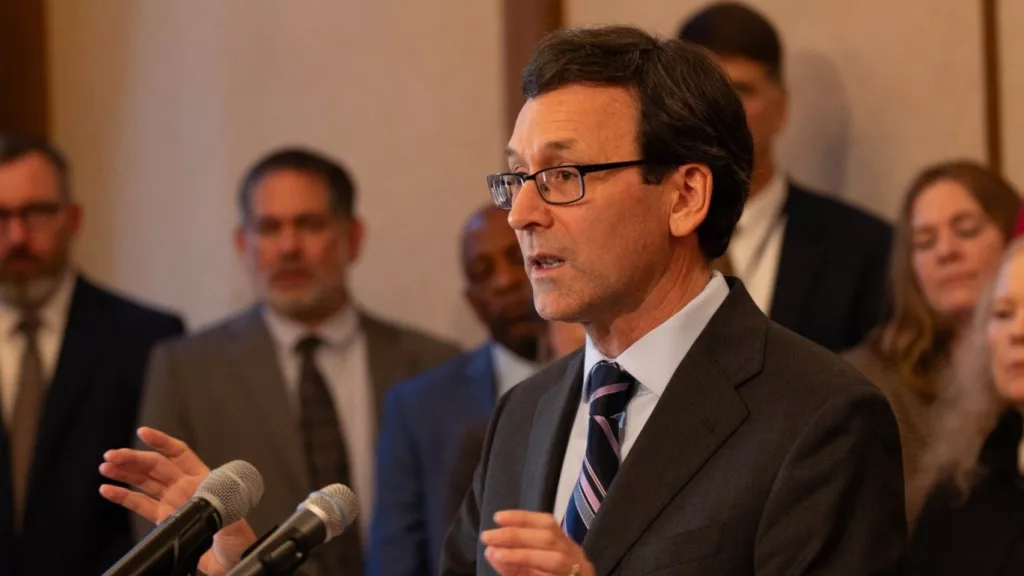OLYMPIA, WA – Hoteliers, restaurateurs and grocers are asking Washington Gov. Bob Ferguson to veto part of a tax bill that they say will drive up food costs for them and their customers.
Excising the contentious provision that is counted on to raise hundreds of millions of dollars would knock the budget out of balance, and force Ferguson to call lawmakers back into special session, supporters said.
The debate centers on House Bill 2081, which contains an across-the-board boost in taxes for tens of thousands of businesses, including those in the hospitality and food industries, and a temporary surcharge on some of the state’s highest-grossing firms.
The Washington Hospitality Association and Washington Food Industry Association asked Ferguson on April 29 to remove the section imposing the three-year, 0.5% surcharge as it would hit food wholesalers and, when combined with the general increase, be a double hit to consumers.
These groups point out that some of the state’s biggest corporations in other sectors, including Boeing, oil refiners, and tech companies, are exempt from the surcharge.
“Food is not a luxury; it is a necessity. These costs will be passed on to retail operations, meaning the food you buy at your grocery store or meal you buy at your restaurant will undoubtedly increase in price,” Anthony Anton, president and CEO of the Washington Hospitality Association, wrote in the letter.
House Bill 2081 anchors the $9.4 billion tax package Democratic lawmakers put together to balance the next budget and overcome a projected multibillion-dollar shortfall over the next four fiscal years. Lawmakers passed the tax bill in the final days before this year’s state legislative session wrapped up on April 27.
A fiscal analysis shows the controversial surcharge would generate an estimated $1.86 billion. Paring that sum would force lawmakers to meet in special session to revise spending in the next budget that begins July 1, said House Majority Leader Joe Fitzgibbon, D-West Seattle.
Fitzgibbon said he has not spoken with Ferguson about this legislation.
House Bill 2081 would affect an estimated 191,000 taxpayers and is projected to bring in nearly $2.1 billion for the budget that begins July 1, and $5.6 billion over four years.
The House bill, which passed over the strenuous objections of Republican lawmakers, would permanently increase the state’s two primary business and occupation tax rates on gross proceeds — 0.471% and 0.484% — to 0.5%, starting Jan. 1, 2027. Those would be the first increases to what’s known as the B&O tax rate since 1983, according to Democrats.
About 300 taxpayers with more than $250 million in annual revenue would be subject to the additional 0.5% surcharge for three years starting Jan. 1, 2026. That extra tax would be levied on amounts above the $250 million threshold. Among the affected industries are retailers, wholesalers, waste management services, real estate, construction, utilities and health care.
State officials estimate the surcharge will produce $1.86 billion over four years – $649 million for the next budget and $1.2 billion in the one after that.
About $100 million of the total would come from food wholesalers, according to the association. Another big chunk, about $210 million, would come from health care systems such as Multi Care and Providence, a Washington State Hospital Association representative said.
Anton said the hospitality and food industry associations are not contesting the across-the-board tax increase, only the surcharge, because of concerns over how the doubling of the tax rate for food suppliers will trickle down.
He lamented that attempts to amend the bill to exempt food wholesalers were defeated in the House and Senate by majority Democrats.
Yet, he noted, the Legislature granted exemptions “to some of the largest companies in the state – tech companies, fuel suppliers, timber companies and others.”
House Bill 2081 exempts manufacturing, retail and wholesale sales of motor vehicle fuel and petroleum products, farmers, some large financial institutions and a select number of high-tech firms paying a special levy to support higher education, including student financial aid.
Boeing is among the exempted manufacturers. Weyerhaeuser and Marathon Petroleum Corp., which operates a refinery in Anacortes, are examples of other well-known companies exempted.
So too are about 160 taxpayers that are assessed the “advanced computing surcharge.” This levy is applied to firms with global revenue above $25 billion – think Microsoft and Amazon.
The bill would raise the surcharge rate from 1.22% to 7.5% and boost the cap on payments from $9 million to $75 million. These changes could generate roughly $554 million for the next budget and nearly $820 million in the 2027-29 biennium, according to figures shared by the House Democratic Caucus.
Decisions on exemptions were calibrated for fairness and protecting consumers, said Rep. April Berg, D-Mill Creek, chair of the House Finance Committee.
They didn’t want to hit the tech giants with two surcharges, she explained.
Refiners were exempted because Democrats also passed an increase in the fuel tax. Exemptions for income earned from the retail sale of food, fuel and prescription drugs not subject to a sales tax are intended to shield smaller businesses and consumers from the impacts, Berg said.
“We were very careful. We’ve got to make sure our state is on steady ground,” Berg said, adding that she “hoped our business community responds with calm and not alarm.”
This story first appeared on Washington State Standard.
